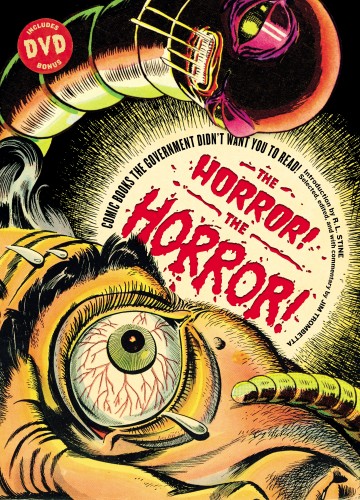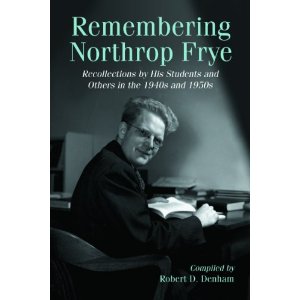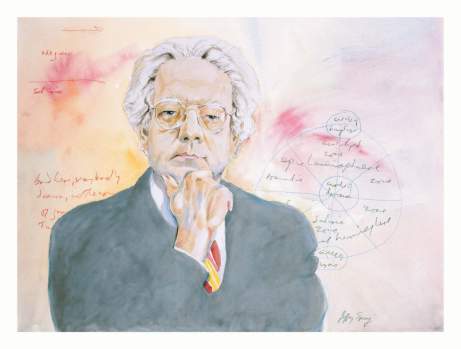George Elliot Clark in The Chronicle Herald reviews The Horror! The Horror!: Comic Books the Government Didn’t Want You to Read compiled by Jim Trombetta, which refers to Marshall McLuhan, George Grant, and Northrop Frye.
Author Archives: Michael Happy
Caligula
httpv://www.youtube.com/watch?v=YfgDPLkMg-w
From the British television adaptation of Robert Graves’s I, Claudius: Caligula (now incarnated as Jove) addresses the Senate after winning his “battle against Neptune”
On this date in 41 the emperor Caligula was assassinated (born 12).
Frye in The Double Vision:
In religion, too, we must keep a critical attitude that never unconditionally accepts any socially established form of revelation. Otherwise, we are back to idolatry again, this time a self-idolatry rather than an idolatry of nature, where devotion to God is replaced by the deifying of our own present understanding of God. Paul tells us that we are God’s temples [1 Corinthians 3:16]: if so, we should be able to see the folly of what was proposed by the emperor Caligula for the Jerusalem temple, of putting a statue of ourselves in its holy place. (CW 4, 197)
Northrop Frye (1912-1991)
Frye Video
Saturday Night at the Movies: “Animal Farm”
httpv://www.youtube.com/watch?v=NZldlyeR8DU&ob=av1el
The anniversary of George Orwell’s death passed this week, so posting the 1954 film adaptation of Animal Farm seems the appropriate thing to do. Our earlier posting of 1984 is here. (The video is not embedded, but clicking on the image and hitting the YouTube link will take you to the entire one hour and eleven minutes of the movie in a single continuous post.)
Frye in his unsigned 1950 Canadian Forum obituary of Orwell:
George Orwell, whose real name was Eric Blair, died recently of tuberculosis, while still in his forties. His background was public-school upper-middle-class society — or, at any rate, a career in that class was certainly open to him. He saw service with the Imperial army in Burma, and was not encouraged by what he saw of imperialism. In politics he drifted far to the left of Communism, and took part in the Spanish war in an anarchist brigade. He was thus an anti-Stalinist revolutionary, but there was never anything in him of the “god that failed” bluster of the Communist converts who despise those who have never been taken in by Communism almost as much as they do the Communists. (CW 29, 86)
Apple and Orwell and “1984”
httpv://www.youtube.com/watch?v=HhsWzJo2sN4
On this date in 1984 Apple ran their famous Orwell-inspired ad for the Macintosh computer during the Super Bowl. Yesterday was George Orwell’s birthday, the anniversary for the founding of Apple recently passed, and we’ve already posted this week on journalism, propaganda and advertising, so this is an attention-catching confluence of events. The Apple commercial was notoriously revived for this independently produced Obama ad during the ’08 Democratic primaries.
httpv://www.youtube.com/watch?v=Lsa139XrCsQ
The cleverness and high degree of irony in both of these ads does not seem to get us around Frye’s observation that advertising is “a judicious mix of flattery and threats.” But thank God for the irony, at least, because we’ve also posted this week on the unironic and commercially-funded threats that try to pass for journalism, here and here.
TGIF: “God, I’m so sorry, but yes”
httpv://www.youtube.com/watch?v=FNUfDYGUueE
The Onion News Network parodies cable news so that you don’t have to watch it. This is so note perfect that you won’t ever wonder again if you should tune in, even for just a minute.
Video of the Day: “You’re going to have to shoot them in the head”
httpv://www.youtube.com/watch?v=cQcvbw6ExTQ&feature=topvideos
This video of Glenn Beck from last June has just surfaced and is newly posted on YouTube.
George Orwell
httpv://www.youtube.com/watch?v=7n4EDKUB9uo&feature=related
From the 1985 film adaptation of 1984: The principle of perpetual war explained (video not embedded: click on the image and hit the YouTube link)
On this date in 1950 George Orwell died (born 1903).
Frye in The Educated Imagination:
The essential thing is the power of choice. In wartime this power is greatly curtailed, and we resign ourselves to living by half-truths for the duration. In a totalitarian state the competition in propaganda largely disappears, and consequently the power of imaginative choice is sealed off. In our hatred and fear of war and totalitarian government, one central element is a sense of claustrophobia that the imagination develops when it isn’t allowed to function properly. This is the aspect of tyranny that’s so prominently displayed in George Orwell’s 1984. Orwell even goes so far as to suggest that the only way to make tyranny permanent and unshakable, the only way in other words to create a literal hell on earth, is deliberately to debase our language by turning our speech into an automatic gabble. The fear of being reduced to such a life is a genuine fear, but of course as soon as we express it in hysterical cliches we are in the same state ourselves. As the poet William Blake says in describing something very similar, we become what we behold. (CW 21, 490)
Frye Alert
httpv://www.youtube.com/watch?v=FpoyshqB8-o&feature=related
Twelve of the most famous seconds from a romantic classic, Casablanca
James MacDowell at The Lesser Feat has a post titled “Sex, Rom Coms, and Final Couples” that opens with just the right citation from Frye’s “The Archetypes of Comedy.”


